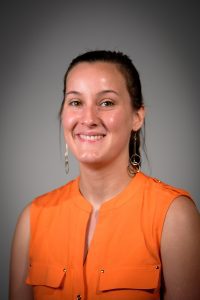By: Shannon Hayes, Policy Analyst, State & Federal Policy
As students across the nation head back to the classroom, we are celebrating First-Generation students. A First-Generation College Student is defined as a student whose parents didn’t attend college; or is the first person in their immediate family to attend college; or neither parent has at least one year of college. We continue on from our August focus of sharing stories from First-Generation College Students.
Well-meaning voices in education rightfully highlight the difficulties that many first-generation (or “first-gen”) students—those who are the first in their families to attend college—face getting to and through higher education. Given this, it’s important to highlight examples of first-gen students who found a pathway to success. I interviewed a few of my friends who were first-generation students; their stories are both helpful for policymakers and inspiring to today’s first-generation students and to all who care about their success.
As one of my interviewees, Nikki, said, “All first-gen students aren’t alike, and at the end of the day, they’re still just teenagers trying to find the right fit.” First-generation students come from different cultures, have different levels of resources, attend different secondary schools, and have parents with varying abilities to help. But all of them want to and have the capacity to succeed in higher education when they get the assistance they need.
Corinne

Plenty of students whose parents grew up in the United States struggle as well, especially if they are not sure how they will afford college. Corinne Menz said, “I was not as aware of my first-gen status as I was my overall financial situation. . . . It wasn’t until I was accepted to several colleges and started receiving financial aid offers that I became aware of how much assistance was offered for first-gen students.” This aid came despite “admissions staff from several schools not [being] terribly impressed that I attended a public high school in Baltimore, and not one of the well-known private schools.” She ultimately chose to attend Randolph-Macon College in Ashland, VA, where she was excited “to be the first person in my family to earn my bachelor’s degree.”
Because finances were a big concern for Corinne, she wishes that she had “been more aware of scholarship opportunities that were available to first-gen students”—neither her high school counselors nor college admissions officers mentioned such opportunities. “Any information on financial aid relating to first-gen status would have been really helpful and encouraging.”
Corinne is currently enrolled in an online graduate program at University of Maryland University College, and feels that she is on “more equal footing” in her courses after her undergraduate experience. And clearly she is: currently “halfway through my degree with a 4.0 GPA” while “excelling in my career.”
Faika

Faika Kabir’s parents received higher education in Bangladesh, but she was the first in her family to attend college in the United States. According to Faika, cultural differences meant that her family members didn’t always understand the American college process enough to help. “Applying for my undergrad degree . . . was a surreal experience filled with anxiety [and] uncertainty since I was applying for financial aid”; she felt as though she were “picking colleges by myself without any assistance or guidance.”
Faika made it to John Jay College of Criminal Justice in New York City, where she was able to use her experience to later “help many Bengali-immigrant, first-generation young adults with their college applications and financial aid packages.”
She also found that her better vision for what she wanted from school, as well as mentors who “guided me to stand up for my own values and chase my dreams,” made her feel much more comfortable applying to graduate school. Faika currently attends The George Washington University in Washington, DC, where she is working toward a Master’s degree in Public Administration.
Nikki
Even first-generation students who attended a “fantastic private [high] school” don’t necessarily have an easy time finding a college. Although Nikki Iselin felt “lucky to be at a [high school] that exposed students to the variety of colleges available to us,” she “didn’t know where to begin” the college application process. Her high school’s college counselor hadn’t “put together a ‘good fit’ list for me that reflected what I was looking for in a school. . . . Ultimately I think it was assumed that students would be able to figure out how to apply on their own.” But she emphasized to me that counselors and admissions officers “should know . . . that all first-gen students aren’t the same.”
Instead, with her mom’s help, Nikki was able to go “through the giant Fiske Guide to College book to pick out some potential colleges,” submit her applications, and apply for scholarships. “I wasn’t aware of my first-gen status at all. I just knew that I had spent years trying to maintain good grades and be a good swimmer so that I could attend a great college.” She ultimately chose Bucknell University in Lewisburg, PA.
Nikki currently teaches at a majority-Hispanic Title I school where many students come from families that had fled violence or political strife in other countries. “You’d be surprised at how observant and aware my fourth-grade students are of their backgrounds. I had one student tell me one day he wants to go to Harvard, but [that] his family doesn’t have any money. I make it a point to tell my students that if they work hard in school, look out for scholarships, and ask for help, they can do anything. I tell my students that I would have never been able to afford Bucknell if I didn’t get a scholarship because of my good grades. I am very candid with my students about my background, because I never want them to think that their parents’ educational experiences or financial situations has to hold them back. It is actually surprising how relevant my experiences are to my teaching, and to the students that I teach.”
Conclusion
These examples show just a few of the paths that first-generation students can take to success—and, not incidentally, to help younger students in the middle of their own college application process understand that they’re not alone. I hope they also help those of us working in education to recognize some of the ways we can help first-generation students find the path that’s best for them:
- Understand that first-generation students can come from many different kinds of high schools and backgrounds.
- Ensure that first-generation students get a high level of support with the college application process, especially given that some of their families may lack knowledge of the US higher education system.
- Help first-generation students channel their motivation to succeed by giving them the information and support they need to make the best choices for their future; for example, make sure they are aware of and understand all of the financial aid resources that may be available to them.
